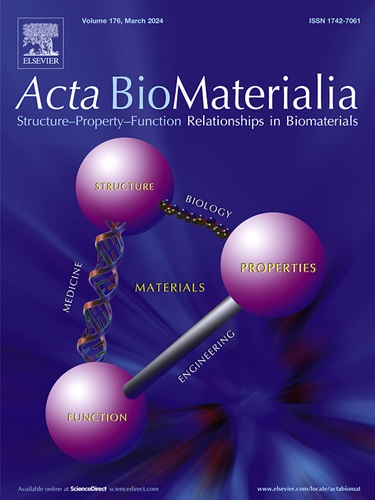Endogenous dysregulated energy and amino acid metabolism delay scaffold-guided large volume bone regeneration in a diabetic rat model with Leptin receptor deficiency
IF 9.4
1区 医学
Q1 ENGINEERING, BIOMEDICAL
引用次数: 0
Abstract
Scaffold-guided bone regeneration (SGBR) offers a promising solution for treating large-volume bone defects. However, its efficacy in compromised healing environments, such as those associated with metabolic conditions like Type 2 Diabetes (T2D), remains poorly understood. This study evaluates the potential of 3D-printed polycaprolactone (PCL) scaffolds for large-volume bone regeneration in preclinical models simulating T2D-induced metabolic challenges. Our results reveal that scaffolds alone are insufficient to overcome the metabolic barriers to effective bone regeneration. Metabolomic analysis of regenerating tissue identified significant disruptions in key metabolic pathways involved in energy production and amino acid synthesis in T2D rats compared to controls. Notably, aconitic acid, ornithine, and glycine levels were elevated in non-diabetic conditions, whereas phosphoenolpyruvate was markedly increased under T2D conditions. Secondary harmonic generation (SHG) imaging further demonstrated impaired collagen organization within T2D regenerating tissue, correlating with disrupted collagen synthesis critical for bone matrix formation. In vitro, the exogenous supplementation of alpha-ketoglutarate (α-KG)—a crucial citric acid cycle intermediate—enhanced mineralized tissue formation in human adipose-derived mesenchymal stem cells (hAdMSCs) from T2D donors, achieving levels superior to non-T2D cells. These findings underscore the metabolic underpinnings of impaired bone regeneration in T2D. Optimized 3D printed scaffolds alone do not counterbalance the impaired regeneration in T2D. Here we highlight a therapeutic potential of metabolic supplementation to optimize SGBR outcomes. This study provides a critical foundation for advancing translational research and developing regenerative therapies tailored to high-risk metabolic disease populations.
Statement of significance
SGBR holds great promise for addressing large bone defects, but its efficacy in metabolically challenged conditions like T2D remains limited. This study uses a metabolomics-driven approach to reveal how metabolic dysregulation in T2D, including disruptions in energy and amino acid pathways, impairs collagen organization and extracellular matrix (ECM) formation—critical for successful bone healing. By identifying α-KG as a potential supplement to restore metabolic balance, this work offers novel insights into enhancing scaffold performance under compromised conditions. These findings provide a foundation for integrating bioactive compounds into scaffold designs, advancing personalized strategies in regenerative medicine, and addressing a critical gap in bone defect treatment for diabetic patients.
内源性能量和氨基酸代谢失调延迟支架引导的瘦素受体缺乏糖尿病大鼠模型的大体积骨再生
支架引导骨再生(SGBR)为治疗大面积骨缺损提供了一种很有前途的解决方案。然而,其在受损愈合环境中的功效,如与2型糖尿病(T2D)等代谢疾病相关的环境,仍然知之甚少。本研究评估了3d打印聚己内酯(PCL)支架在模拟t2d诱导代谢挑战的临床前模型中用于大容量骨再生的潜力。我们的研究结果表明,支架本身不足以克服有效骨再生的代谢障碍。与对照组相比,再生组织的代谢组学分析发现,与能量产生和氨基酸合成有关的关键代谢途径在T2D大鼠中明显中断。值得注意的是,在非糖尿病患者中,乌头酸、鸟氨酸和甘氨酸水平升高,而在糖尿病患者中,磷酸烯醇丙酮酸水平明显升高。二次谐波生成(SHG)成像进一步显示了T2D再生组织中胶原组织受损,与对骨基质形成至关重要的胶原合成中断相关。在体外,外源性补充α-酮戊二酸(α-KG)——一种至关重要的柠檬酸循环,可增强来自T2D供体的人脂肪源性间充质干细胞(hAdMSCs)的矿化组织形成,其水平优于非T2D细胞。这些发现强调了t2dm中骨再生受损的代谢基础。优化的3D打印支架本身并不能抵消T2D中受损的再生。在这里,我们强调了代谢补充的治疗潜力,以优化SGBR的结果。这项研究为推进转化研究和开发针对高危代谢疾病人群的再生疗法提供了重要的基础。意义声明:支架引导下的骨再生(SGBR)在解决大型骨缺损方面前景光明,但其在2型糖尿病(T2D)等代谢紊乱疾病中的疗效仍然有限。这项研究使用代谢组学驱动的方法来揭示t2dm中代谢失调(包括能量和氨基酸途径的中断)如何损害胶原组织和细胞外基质(ECM)的形成——这对成功的骨愈合至关重要。通过鉴定α-酮戊二酸酯(α-KG)作为恢复代谢平衡的潜在补充剂,这项工作为在受损条件下增强支架性能提供了新的见解。这些发现为将生物活性化合物整合到支架设计中提供了基础,推进了再生医学的个性化策略,并解决了糖尿病患者骨缺损治疗的关键空白。
本文章由计算机程序翻译,如有差异,请以英文原文为准。
求助全文
约1分钟内获得全文
求助全文
来源期刊

Acta Biomaterialia
工程技术-材料科学:生物材料
CiteScore
16.80
自引率
3.10%
发文量
776
审稿时长
30 days
期刊介绍:
Acta Biomaterialia is a monthly peer-reviewed scientific journal published by Elsevier. The journal was established in January 2005. The editor-in-chief is W.R. Wagner (University of Pittsburgh). The journal covers research in biomaterials science, including the interrelationship of biomaterial structure and function from macroscale to nanoscale. Topical coverage includes biomedical and biocompatible materials.
 求助内容:
求助内容: 应助结果提醒方式:
应助结果提醒方式:


